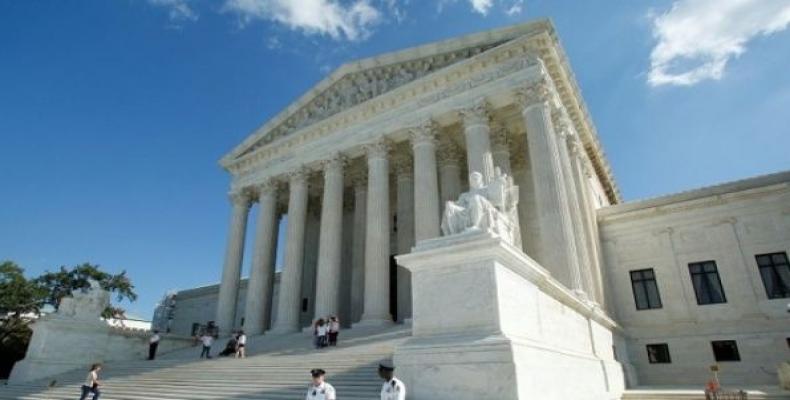Washington, Feb 28 (RHC)-- The U.S. Supreme Court has ruled that immigrants, even those with permanent legal status and asylum seekers, do not have the right to periodic bond hearings.
It's a profound loss for those immigrants appealing what are sometimes indefinite detentions by the government. Many are held for long periods of time — on average, 13 months — after being picked up for things as minor as joyriding. Some are held even longer.
The case, Jennings v. Rodriguez, has implications for legal permanent residents whom the government wants to deport because they committed crimes and asylum seekers who are awaiting a court date after turning themselves in at the border. Immigrant advocates contend that many of these immigrants have a right to be free on bail until their case is heard.
But the court wrote in its 5-3 opinion: "Immigration officials are authorized to detain certain aliens in the course of immigration proceedings while they determine whether those aliens may be lawfully present in the country."
No one can claim, nor since the time of slavery has anyone to my knowledge successfully claimed, that persons held within the United States are totally without constitutional protection.
The majority opinion was penned by Justice Samuel Alito and joined by the court's conservatives. (Justice Elena Kagan did not participate. She recused herself, stemming from work she had done as President Barack Obama's solicitor general.)
The decision reversed a Ninth Circuit ruling, and the court remanded it for the Ninth to reconsider the case. So this is not the last word and could come back to the high court.
Justice Stephen G. Breyer read from his dissent, a rare move for the court that indicates just how passionately he disagrees with the majority opinion. "We need only recall the words of the Declaration of Independence," Breyer said, "in particular its insistence that all men and women have 'certain unalienable Rights,' and that among them is the right to 'Liberty.'" He continued, calling the ruling "legal fiction."
"Whatever the fiction, would the Constitution leave the Government free to starve, beat, or lash those held within our boundaries?" Breyer argued. "If not, then, whatever the fiction, how can the Constitution authorize the Government to imprison arbitrarily those who, whatever we might pretend, are in reality right here in the United States?"
Breyer added, "No one can claim, nor since the time of slavery has anyone to my knowledge successfully claimed, that persons held within the United States are totally without constitutional protection."
The lead plaintiff in the case is a legal permanent resident, Alejandro Rodriguez, who came to the U.S. as a child and worked as a dental assistant. As a teenager, he was convicted for joyriding, and at 24, he pleaded guilty to misdemeanor possession of a controlled substance.
U.S. Supreme Court ruling means immigrants could continue to be detained indefinitely

Articles en relation
Commentaires
Laissez un commentaire
Tous les champs sont requis
En reproduction maintenant
Desde Mi Habana
Au suivant
- Cartas a la Redacción
- Cancionero Iberoamericano
- Mundo 7
Plus de visites
- Lula rejette le blocus de Cuba au sommet de la Celac et met en garde contre l'ingérence
- La levée du blocus américain contre Cuba est demandée en France
- Le gouvernement guatémaltèque est appelé à rejeter les positions extrêmes interventionnistes des États-Unis à l'égard de Cuba
- L'ambassadeur de Cuba au Venezuela remercie la solidarité internationale avec les missions médicales (+Photo)
- Le président Díaz-Canel rentre à Cuba après avoir participé au sommet de la CELAC au Honduras (+Photo)

